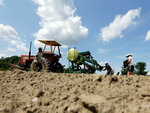A few of our stories and columns are now in front of the paywall. We at The Chief-Leader remain committed to independent reporting on labor and civil service. It's been our mission since 1897. You can have a hand in ensuring that our reporting remains relevant in the decades to come. Consider supporting The Chief, which you can do for as little as $3.20 a month.


Nearly one in five farmworkers in New York State has lost work time as a result of being injured on the job, while nearly half of workers who were injured say they received no compensation for lost work time or medical care. Another 25 percent of farmworkers reported wage theft by their employers after not being paid for their overtime.
Conversely, the majority of farmworkers are being paid overtime according to recently instituted state regulations, while nearly all earned more than the minimum wage.
Those findings, based on responses to the largest-ever survey of farmworkers in New York State, followed the enactment of the Farm Laborers Fair Labor Practices Act of 2019, which granted farmworkers time-and-a-half overtime pay after 60 hours in a calendar week, disability pay, paid family leave and unemployment coverage, among other protections.
Overall, however, the authors of a report based on the survey concluded that farmworkers in the state face significantly more health risks than the general population. They also are not pursuing what they are owed or due.
“Our data support previous findings that farmworkers and their families experience noteworthy physical and mental health hazards, poor access to health services, and have fewer health and safety protections than other workers,” said Kelly Miller, one of three authors of the report, during a video presentation of its findings last week.
It’s also clear that farmworkers are not filing workers’ compensation claims or trying to secure paid sick leave, said Nina Donaldson, another of the report’s authors.
That’s likely because of language barriers, a lack of familiarity with workers’ comp and sick leave provisions, or because employers themselves are paying for care and lost work time.
In any case, Donaldson added, not filing claims could lead to significant future burdens.
“Workers may not realize that without a workers’ compensation claim, they will likely have to pay for long-term injuries themselves or just suffer without further treatment. We think that this is the most significant finding in the report and could potentially have a long term effect on workers health,” she said.
‘A need for investments’
The 52-page report was based on responses in the winter and spring of 2022 from 530 respondents, the majority of them undocumented or working through guest worker programs, and laboring on at least 100 farms. Long Island respondents accounted for 63 percent of respondents while 37 percent were from Upstate.
The report’s authors sought to collect data about on-the-job injuries, compensation for lost work time, working hours, wages and also to evaluate the implementation of the new overtime provisions.
Julie Sorensen, the director of the New York Center for Agricultural Medicine and Health, said that data otherwise collected from numerous sources suggests that farmworker injury rates are about 12 per 100 full-time equivalent workers annually, with a high proportion of injuries strains and sprains. That rate is several times higher than for the private sector overall, according to the U.S. Bureau of Labor Statistics. (Miller, though, noted that the BLS does not have data on injuries that happen on small farms, which are those that employ fewer than 11 non-family-member workers.)
Sorensen added that the injury rate for owners and operators of farms, who tend to be older and work longer hours, is several times higher that for hired farmworkers, all of which she said “underscores a need for investments in prevention, training, healthcare and structural support for the farm community as a whole.”
She nonetheless noted a “ray of hope” in that injuries and fatalities have been trending downward over the last two decades. “So I think that we have made progress to some extent,” she said, adding that the agriculture industry “fought very hard to increase state investment in agricultural worker safety training, health services and injury prevention” and that the state had recently doubled its investments in agricultural health and safety.”
Bargaining rights
The protections afforded by the Farm Laborers Fair Labor Practices Act follow decades of inadequate protections or benefits or even relief for workers toiling on state farms.
As the report notes, it was only in 1996 that all farms, rather than just those with five or more employees, were required to provide clean, cool drinking water. And it was just in 1998 that labor law required that all farmworkers have access to toilets and hand-washing facilities within a quarter-mile. It also took until 1999 for state farmworkers to be included in the state’s wage law, whereas before just the lower federal minimum wage applied.
And farmworkers were denied the ability to collectively bargain until 2019, when they gained the right to unionize through a card-check process following passage of the Farm Laborers Fair Labor Practices Act. The legislation followed a state Supreme Court finding that a clause within state labor law excluding farmworkers from organizing was unconstitutional.
Margaret Gray, an associate professor of political science at Adelphi University and the report’s lead author, noted that the collective-bargaining protections outlined under FLPA “have borne fruit.” She said that workers now express the desire to unionize precisely to have their basic rights respected.
“So certainly in an arena where workers have union representation and then are able to have a contract, that's undoubtedly going to lead to better employment behavior on the part of the employer,” Gray said. “And I think one of the things that might really surprise folks is the idea that workers are unionizing again just to fulfill their basic rights. And I've heard this directly from workers themselves.”
Still, there remain challenges for farmworkers looking to unionize. As one ag worker quoted in the report noted, reprisals can be fierce.
“In terms of organizing, I am very nervous about losing my job. I know it’s technically illegal for the bosses to punish someone for wanting to organize, but I know workers who have been fired for this,” the worker said.
Donaldson, though, recalled one of the workers at a Long Island vineyard who voted to unionize in 2021, Jorge Ramirez, saying that there had been a noticeable shift in worker-employer relations since the workers voted to unionize.
“The difference now is that ever since the union is here, now when the boss speaks to us they speak to us with respect,” Ramirez told the nonprofit news site Documented. “Whenever they need us to do something they ask, please can we do this? In the past, they did not do that.”
Diana Caba, the vice president for community and economic development at the New York City-based Hispanic Federation, said the survey’s most important component was that it documented “the many experiences and stories” she and her colleagues have been hearing as they work to address “the grave injustices” faced by farmworkers in New York State.
While a newly constituted wage board’s decision to phase in the overtime rules was notable, she noted that the survey’s findings regarding lost pay attributable to injuries, wage theft and unpaid overtime were particularly concerning given that farming ranks among the most dangerous occupations.
“These findings reveal direct violations to the laws and protections farm workers and advocates have fought so hard to achieve,” she said.
Farmworkers’ predicaments are particularly onerous given their status, Caba said. She quoted one worker’s sentiments, cited in the report: “This is dangerous work. We don’t talk about it because we want and need to work. To be hired, you can’t be known as someone who talks about the risks of this job.”
richardk@thechiefleader.com
Comments
No comments on this item Please log in to comment by clicking here